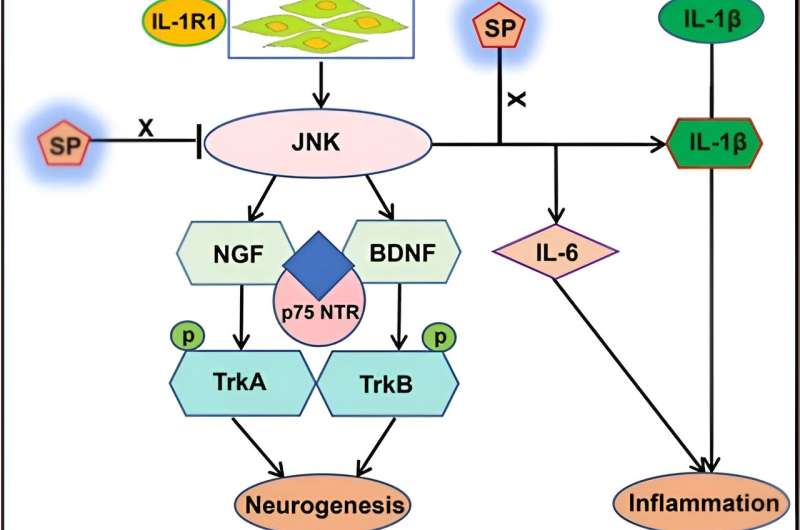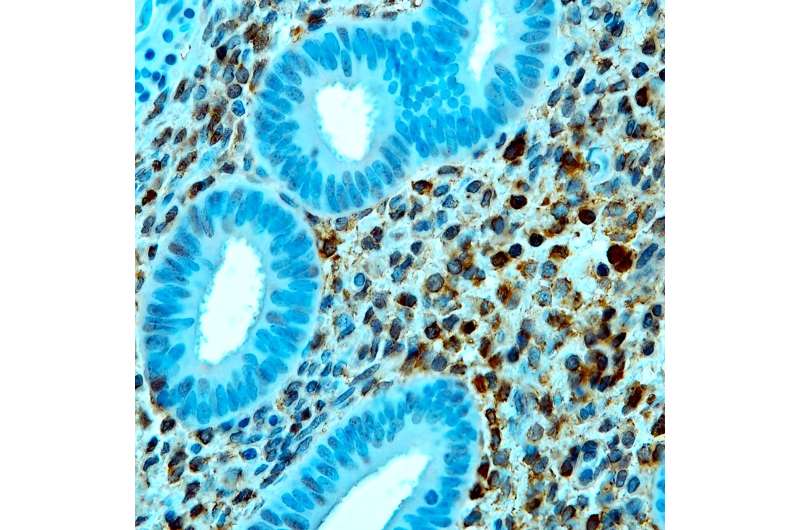This article has been reviewed according to Science X's editorial process and policies. Editors have highlighted the following attributes while ensuring the content's credibility:
fact-checked
peer-reviewed publication
trusted source
proofread
New research shows potential to reduce pain in women suffering from endometriosis

Pelvic pain in women with endometriosis is attributed to neuroinflammation. Researchers have investigated biochemical mediators of endometriosis-associated pelvic pain to provide a foundation to identify new drugs to improve symptoms and quality of life.
They postulated that novel therapeutic targets for pelvic pain in endometriosis are regulated by interleukin-1β (IL-1β) via the c-Jun N-terminal kinase (JNK) signaling pathway. IL-1β has been a popular focus of translational research in the field of endometriosis. Their results are published in The American Journal of Pathology published by Elsevier.
Lead investigator Robert N. Taylor, MD, Ph.D., Departments of Obstetrics and Gynecology and of Pathology and Anatomical Sciences, Jacobs School of Medicine and Biomedical Sciences, University at Buffalo, explains, "Endometriosis is common and complex and likely to develop via multiple etiological mechanisms. As a result, multiple therapeutic targets are needed. Strategies over the past five decades have focused on surgical and endocrine approaches. New drugs aimed to block neuroinflammation may be promising future interventions for endometriosis-associated pain."
This collaborative research effort sought to identify biochemical mediators of endometriosis-associated pelvic pain using established neural biomarkers isolated from endometrial tissue biopsies obtained from eight adult women undergoing hysterectomy (four patients with endometriosis; four without). Immunofluorescence histochemistry confirmed the presence of neurons in human endometrial tissue, and isolated endometrial stromal cells (ESCs) expressed neurotrophins and their receptors. Peritoneal fluid samples were analyzed from 14 participants with and 26 participants without endometriosis.

Tropomyosin receptor kinase A/B (TrkA/B) expression in stimulated ESCs was almost twice as high in endometriosis cases than ESCs from control subjects, an effect mediated via the c-Jun N-terminal kinase (JNK) pathway. Investigators therefore postulate that JNK inhibitors have the potential to reduce neuroinflammation in women with endometriosis.
Nerve fibers were identified in the human uterus more than 80 years ago, but only in the past decade has their association with endometriosis pain been appreciated. The main findings of this study are that despite functioning through at least five different post-receptor signal cascades, the IL-1β pathway in ESC that engages JNK regulates a coordinated program of neurogenic factors, their receptors and other related nerve proteins that investigators identified in the uterus and ectopic lesions of women with endometriosis. They also found that JNK inhibitors may have the potential to reduce neuroinflammation in women with endometriosis.
The results revealed that many of the dominant mediators of inflammation, nerve growth, and pain sensation are predominantly communicated via a selective signaling node of the JNK pathway. The most significant implication of this finding is the potential for drugs targeting that common pathway to impact and ameliorate the multifaceted aspects of endometriosis-associated pelvic pain.
Dr. Taylor comments, "Our research and that of others lay a foundation to identify new drugs to block painful stimuli emanating from the pelvis to the brain, opening opportunities to improve symptoms and quality of life in women not well served by the limited therapeutics currently available. Drugs of the future that target JNK specifically, but do not interfere with ovarian hormone production, might supplant current hormone-disrupting agents, many of which have adverse side effect profiles."
Endometriosis is a disease in which tissue similar to the lining of the uterus grows outside the uterus. It can cause severe pain in the pelvis and infertility. It affects 5% to 10% of women of reproductive age worldwide.
More information: Jie Yu et al, Neurotrophins and Their Receptors, Novel Therapeutic Targets for Pelvic Pain in Endometriosis, Are Coordinately Regulated by IL-1β via the JNK Signaling Pathway, The American Journal of Pathology (2023). DOI: 10.1016/j.ajpath.2023.04.007





















